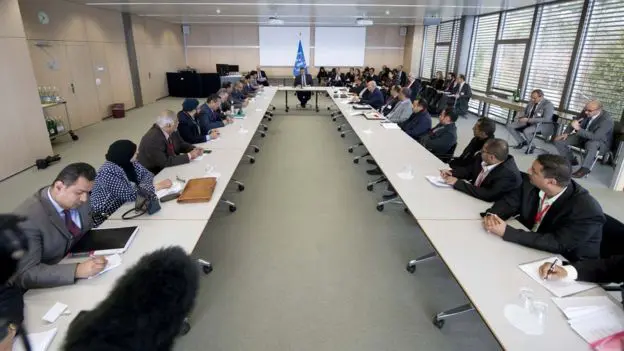The latest cease-fire in Yemen starting a week ago was supposed to pave the way for a newest round of peace talks to kick off in Kuwait on Monday, but the warring sides' acts in the field have drummed out their earlier willing words to end the hostility, leaving many to fear, again, a similar dim future for the talks as previous ones.
A UN-brokered cease-fire went into effect at midnight on April 10 between Saudi-backed Yemeni government forces and armed rebels of the Shiite Houthi group across seven provinces in the war-torn Arab country.
Though both sides had said they would honor the truce before the talks in Kuwait, which will be the fifth round after all previous ones had failed to yield any progress, military actions continued on the ground.
Four days into the cease-fire, the Houthis said many of their fighters were killed while countering their opponents' advances, which "could affect the ongoing understandings and progress of the upcoming political talks," according to a Houthi spokesperson.
Pro-government media outlets also said a high-ranking loyalist brigadier general and a dozen of soldiers died fighting Houthi rebels in Nehim, some 30 km northeast of the Houthis-controlled capital Sanaa.
"Nothing changed" after the cease-fire, said a local resident near Nehim, as both the warring sides were reportedly reinforcing their frontlines and repositioning heavy weapons for further advances.
The United Nations hopes the truce would facilitate the Kuwait talks and push the war-torn country one step closer to ending a war that has raged for more than a year and killed over 6,000 people, mostly civilians.
Local observers, however, feared the talks had already failed even before it begins, given the "same mentalities of military, tribal and political leaders who have been weakening the state and deepening conflict," said Fuad Alsalahi, a political sociology professor at Sanaa University.
The professor does not believe the Kuwait talks would produce anything new to replace the 2011 Gulf Initiative, a mechanism that was supposed to guarantee a new form of power sharing among "the same corrupt and violent factions." Instead, the new talks would only keep the poor country in a "viscous circle of fake peace or rather violence," and such reconciliation will "inevitable pose a serious threat to Yemen's unity."
Monday's meeting in Kuwait is the first time that members of the Gulf Cooperation Council (GCC), notably Saudi Arabia which is leading a Arab coalition force to back Yemeni President Abd-Rabbu Mansour Hadi against the Houthis, have clearly showed a strong desire to try a new path in dealing with the crisis, by political means only. Those Arab countries, which have influence in Yemen, tried a military means to end the country's complicated problems but unfortunately failed.
This time in Kuwait will be the "last chance" to save Yemen, said Yahia Kholaqi, a political expert in Aden, a southern port city in Yemen where its internationally recognized government is currently based. He sees, however, "no real intentions" among the warring rivals to end the blood shedding by peaceful means and dialogues.
"All the Yemeni warring rivals plan to eradicate each other," Yahia said, depicting them sitting behind the meeting table in Kuwait and at the same time "thinking of military plans to advance against each other inside Yemen."
The Houthis have a "long history of lying and procrastinations, " said political analyst Aizdeen Khaled. They will be in Kuwait, "just to gain more time to organize their forces on ground like in previous peace talks."
He argues that if their "good intentions" means anything, they should release the captivated Yemeni defense minister and other high-ranking political prisoners before the talks.
Aizdeen believes the Saudis had some "direct communications" with Houthi officials only, but not with their powerful ally, former Yemeni President Ali Abdullah Saleh, who stepped down from office in February 2012 and handed power to his then deputy Hadi.
"That's not enough because Saleh is the main disaster that destroyed Yemen," Aizdeen said.
Saleh is "the strongest player in Yemen," said Hussein Aref, a journalist and writer. "He is upset about the latest secret talks between Saudi Arabia and Houthis."
The Houthis want the peace talks to end the conflict because they lost everything during the war, but Saleh want GCC countries to speak to him directly, Hussein said.
Now Saleh is trying to destroy any peaceful plans to stop the war, by escalating the situation on the ground to prove to the Saudis that he has the control and power in Yemen, not the Houthis. He hopes the escalation would force GCC countries to talk with him instead of the Houthis, according to Hussein.
The only and most important upside for the Kuwait talks, as other observers said, is that the Saudis has for the first time accepted a cease-fire, which they had never did during previous meetings.
Meanwhile, the United Nations, while urging for more intervention in an aggravating humanitarian catastrophe in Yemen due to the dragging war, has intensified its push for peace talks.
At least the Houthis have changed their attitude on two key things: they now accept reconciliation in accordance with UN resolution 2216 and return of the legitimate government, which they have never accepted in the past. Enditem
 简体中文
简体中文



